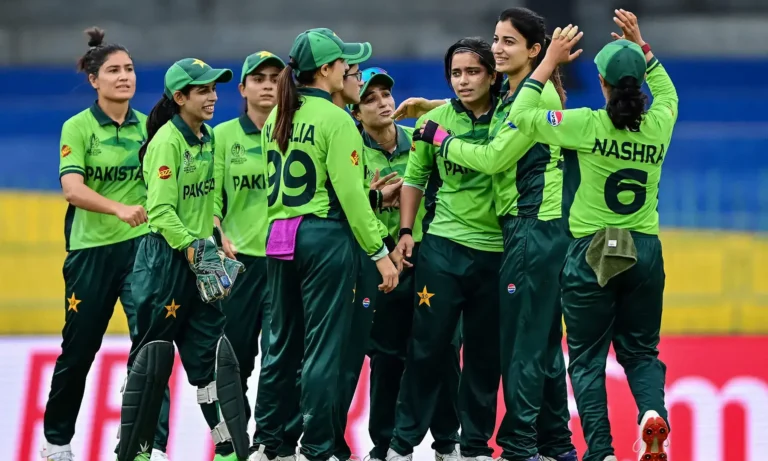Still searching for their rhythm in the ICC Women’s World Cup, Pakistan’s women’s team will face their toughest challenge yet — a confident and in-form Australian side — at the R. Premadasa Stadium in Colombo on Wednesday. After a disappointing start marked by heavy losses to Bangladesh and India, Pakistan enter the contest desperate for a turnaround.
Also Read: Gattuso Expresses Heartache Over Gaza War Ahead of Italy vs Israel Clash
Fatima Sana’s team currently sits at the bottom of the eight-team standings, having struggled in all departments. Their batting has been fragile, bowling inconsistent, and fielding below par — a combination that has left them little room for further mistakes. Facing the defending champions, however, presents not just a challenge but a chance to rediscover their fighting spirit.
Senior batter Sidra Amin, one of Pakistan’s few consistent performers, spoke with quiet determination ahead of the clash. “I think tomorrow is a big game for us as a team,” she said during the pre-match press conference. “We are a good batting side, but as batters, we need to spend more time on the wicket to execute our plans and assess the conditions properly.”
Sidra, who scored a gritty half-century against India, admitted that Pakistan’s batting struggles have often been self-inflicted. “If we look at the bigger picture, we’ve been leaving around five to seven overs unused — that’s about 42 balls,” she explained. “If we tackle that, reduce the dot balls, and stay longer at the crease, the pressure will ease. As batters, we need to take responsibility and bat the full quota of overs.”
In their first two matches, Pakistan managed just 160 against Bangladesh and 180 against India — both times failing to bat 50 overs. The middle order has faltered, and the lower order has failed to add resistance, leaving the team overly reliant on Sidra, Fatima Sana, and Muneeba Ali for runs.
Pakistan’s bowling, traditionally their strongest suit, has also been below expectations. The new-ball duo of Fatima and Diana Baig has lacked consistency, and the spinners — who were expected to thrive in Sri Lankan conditions — have been unable to build pressure. Pakistan’s indiscipline was evident in the 18 extras they conceded against Bangladesh, though Diana’s four-wicket haul versus India showed some signs of improvement.
Sidra said the team’s discussions have focused on accountability. “Our coach has given us guidance, but it’s up to us to execute,” she noted. “Our spinners and attacking bowlers can still trouble their batters — if we hit the right areas and stay composed, we can create chances.”
Yet, Pakistan’s task won’t be easy. Australia, led by Alyssa Healy, remain unbeaten and have looked like the most complete team in the tournament. Their campaign so far has featured a 300-plus total — the only one in the competition — during their emphatic 89-run victory over New Zealand. Ashleigh Gardner’s century in that match underlined the team’s depth, while Annabel Sutherland’s pace and Sophie Molineux’s spin have been key weapons.
Even though some stars, including Healy and Beth Mooney, haven’t hit peak form yet, Australia’s overall balance makes them formidable. Their only interruption came when rain washed out their match against Sri Lanka, preventing them from topping the table.
Australian all-rounder Ellyse Perry spoke respectfully about Pakistan and highlighted Fatima Sana’s impact. “Oh, yeah, she’s an amazing player — a real talisman for the Pakistan team,” Perry said. “She plays with so much passion and energy. It’s always nice to play against someone like her.”
Reflecting on the match conditions, Perry added, “We got a look at the conditions during the India-Pakistan match. It probably hasn’t changed much. We’ve had a good chance to prepare, so we’re ready for what’s ahead.”
For Pakistan, familiarity with Colombo’s pitches could offer a slim advantage, but Sidra Amin knows that will only matter if the team executes their plans. “Yes, we have an edge in terms of playing all our matches here, but using that edge wisely is crucial,” she said. “Australia is a very well-prepared side — they even train in heat-simulated facilities to adjust to Asian conditions. That’s the level of their commitment.”
As Pakistan seek their first win of the tournament, the clash against Australia represents more than just a test of skill — it’s a test of resolve. Against the world’s best, Fatima Sana’s team must rediscover belief, discipline, and the fighting spirit that once defined them.


